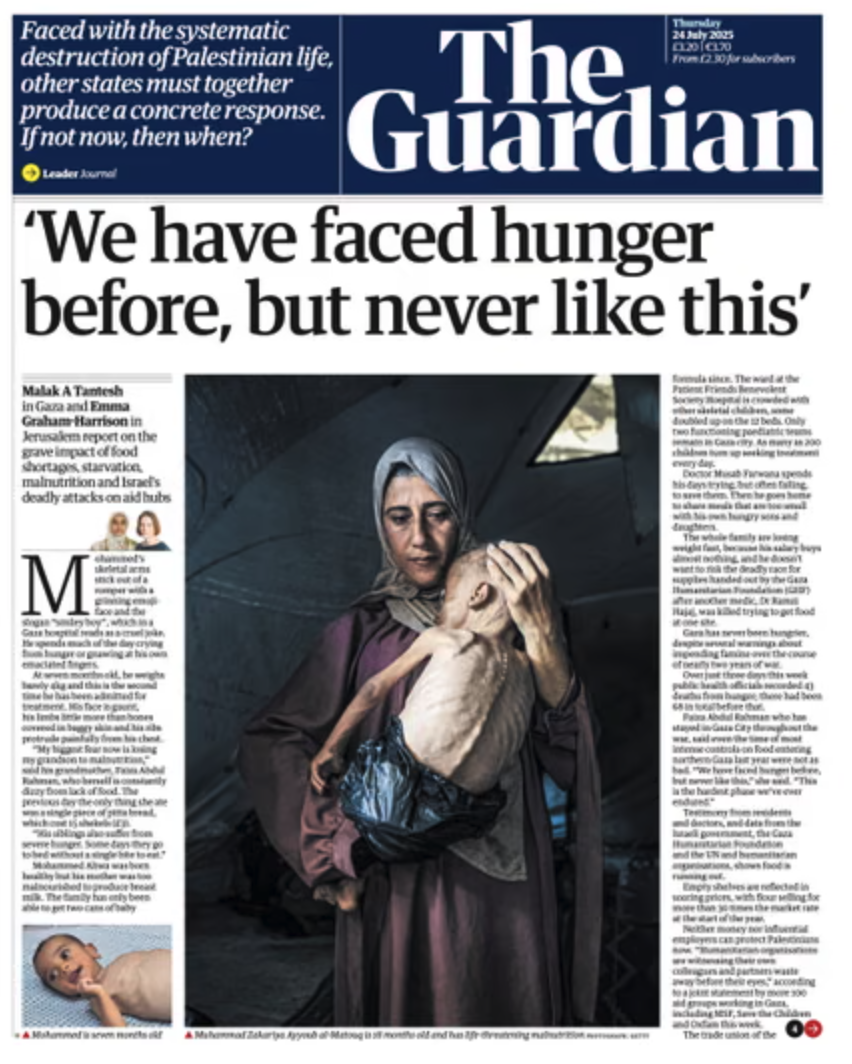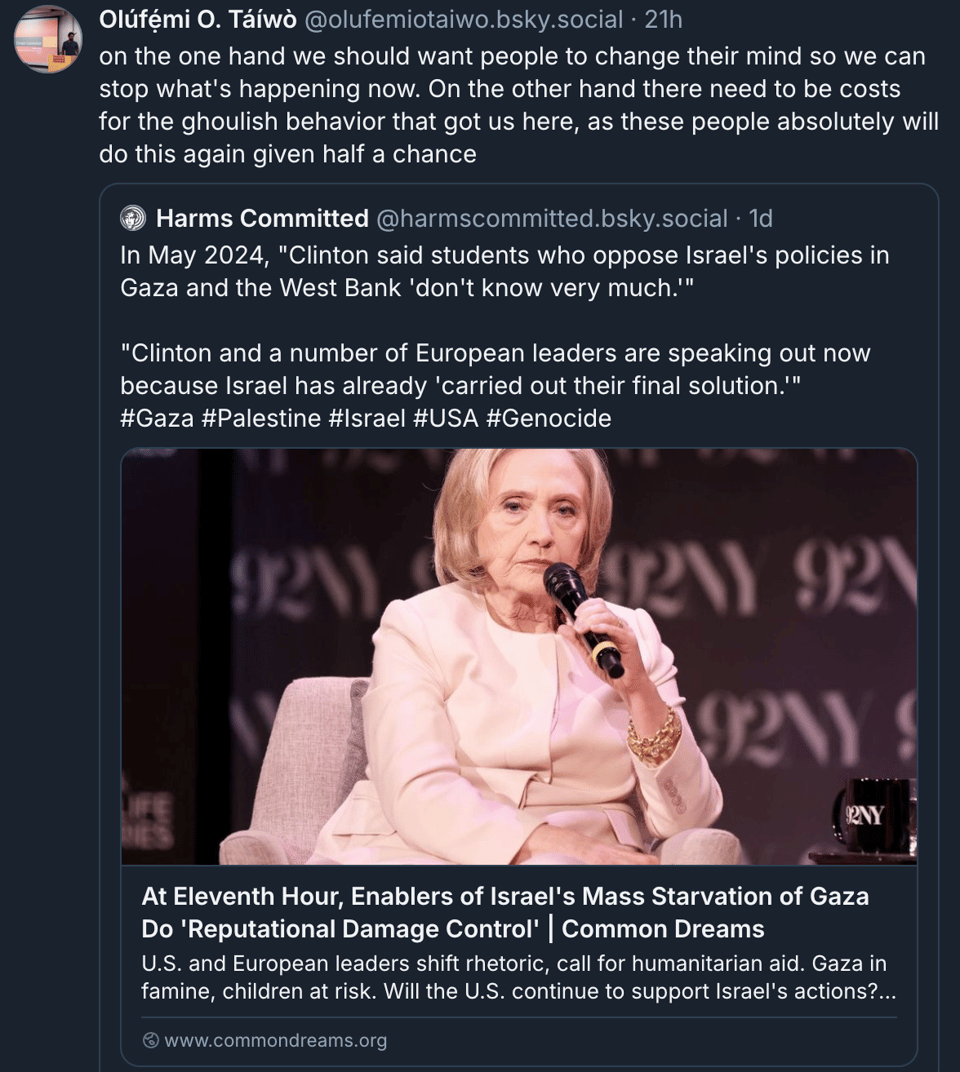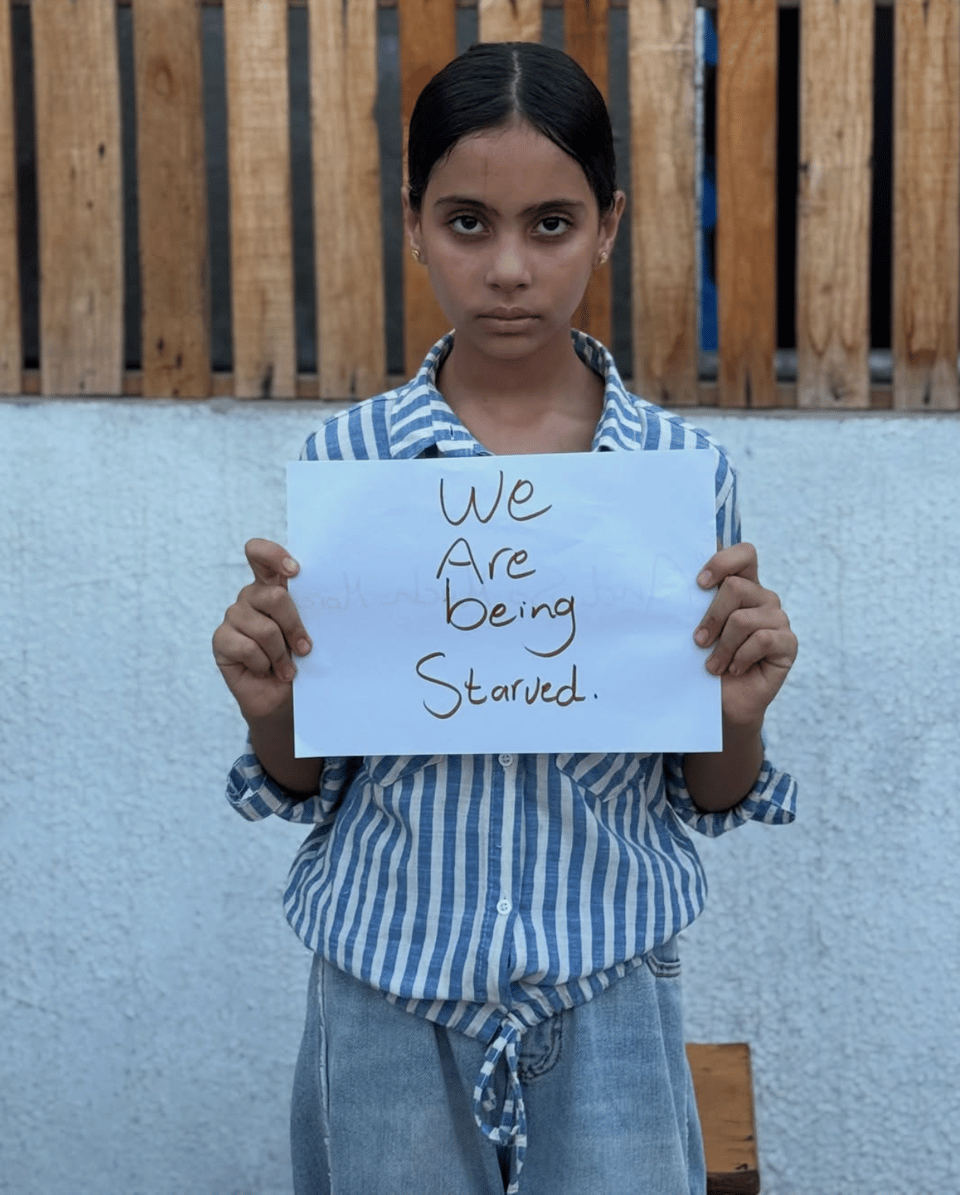Some Anecdotal Musing on Palestine and the Algorithm
July brought two significant developments in Israel’s campaign of genocide in Palestine. The first being that their food and aid blockades have culminated in increasing deaths from starvation, and the second being that some of the major Western news outlets, politicians and public figures who have, for 20-some months, been both-sidesing the genocide at best and openly advocating for it at worst, have finally started to draw a line. A short-lived one, possibly, but for the past week, starving Palestinian children have made it to front pages with varyingly strong words of condemnation of Israel. For people who rely entirely on traditional mass media for their news, this may be the first they’ve heard of the suffering of civilians in Gaza. It’s significant, even if it is appallingly late in the game.

Of course, there’s plenty to discuss around the possibility of a certain amount of ghoulish PR in all this. With Israel running the only four aid provision points in the Gaza strip (at which hundreds of aid-seeking civilians have been murdered by IDF and hired militia members) and keeping most of the international aid at bay, severe malnutrition is setting in across Gaza which, in the most advanced stages, can be irreversible without intensive medical attention and refeeding, and even if averted can carry serious health risks far into the future. It might very well be the case that many people who have known the full extent of the death and violence since the beginning are trying to use this opportunity to establish themselves as having a modicum of morality now that it may be too late to expect them to actually do anything… which is so cynical and putrid and probably true it makes me want to scream.

But they’re not the people I want to (or can bear to) think about right now.
My mind has been snagged on something else.
I’m what you could call pretty online. If you ask my immediate friends and family, they’ll definitely use stronger descriptors, but I’m online enough to know that I’m nowhere near the levels of deeply online you can be. I’m am, however, just the right amount of online to havehave seen the first videos coming out of the Gaza Strip on October 8th, 2023 (and, thanks to a rad Year 12 history teacher, to have been aware of the broader context around the Israeli occupation of Palestine, and the US, UK, France, and Australia’s role in facilitating it since 2004, even if I admittedly hadn’t thought about it in a good long while).
In October 2023, I became the most online I have ever been. I was glued to my phone for months, staring through a window into hell. I saw people camping outside hospitals shredded by explosives specifically designed to kill slowly and painfully, parents scooping what was left of their children into plastic bags, screaming as they tried to find them beneath destroyed buildings, people of all ages hanging in tatters wherever a bomb blast threw them, children huddled in shock beside a strange little thing that, the longer I stared at it, revealed itself to be a child’s hand. There’s a video I think of regularly, two years later, that showed a little boy sitting in a wheelbarrow trying to explain that his brother had been beside him, and then in an instant he wasn’t, and then making the worst sound I’ve ever heard in my life. I’ve seen so many people burning alive. I have watched testimonies from the survivors and daily check ins from journalists and civilians-turned-journalists and chidren-turned-journalists. So many of them are gone now, either dead or without access to the internet or without the strength or energy or hope to keep reaching out to a world that won’t answer.
In the earliest days, I encountered the bulk of these videos and testimonies on TikTok, which was much more of a free-for-all in 2023, and I reshared and boosted these videos as much as I could. On Instagram, though, I noticed the same videos were being censored at a far higher rate than on TikTok (likely the real reason you head so much about TikTok bans in 2023 and 2024). Anything that featured a dead body — or a piece of one — was put behind a mature content filter if posted to the stories feature, and straight up removed, with the user penalised, if posted to the feed. Too many instances of this, or even mentions of certain words (“genocide,” “Palestine”) would see users shadowbanned (internet lingo for “deprioritised by the algorithm”) with their reach significantly limited. Videos and posts that seemed to be unhindered on the pro-Palestinian or critical-of-Israel end of the spectrum were the less visceral but still-chilling infographics, the news pieces from Al Jazeera and similar publications, interviews, and (bloodless) broadcasts by Palestinians on the ground. PG stuff, basically.
And I get it. Kids scroll social media, and most adults don’t want to see the realities of carpet bombing a small, densely inhabited strip for two years without warning, if at all.
But there’s power in seeing something with our own eyes. We saw this when Vietnam became the first televised war in the long, bloody history of humanity, and in turn saw such passionate, unabating opposition from every day people. We’ve seen it for the past two years, where despite the massive suppression of evidence and proliferation of Israeli press releases and propaganda, millions of people have turned out and marched in protest against the genocide on a weekly basis.
And we’re seeing a new wave of it now. Because, predating the articles, the front pages, and the statements from politicians, pictures of emaciated Palestinian children have been crossing my feed and stories unhindered for weeks now.

And while I’m grateful, even at this unforgivably late stage, to see awareness and outrage spreading, I have questions.
Social media algorithms aren’t self-aware. Whatever your local tech dingus tells you, they have neither consciousness nor free will. Any “decisions” made by an algorithm are made according to defined parametres (often determined by wildly exploited content moderators in the global south) according to certain agendas. Meta, we know, has been complicit the digital stoking of genocide before and they’ve been playing ball with the Biden and Trump administrations, both of whom have been all-in on supporting Israel in their campaign against Palestine. So have the starving children of Gaza simply slipped through the cracks in the filter by virtue of not being corpses yet, or not bleeding or screaming enough to trigger a bump in classification, or has someone deliberately okayed this? If it’s the latter, who’s making this decision? And why is this the tipping point, of all the unspeakable things that have happened? Why now?
The answers will be revealed, eventually, in whoever benefits the most. Of course, it’ll be too late for so many.
But whatever the reasoning, this sudden spike in awareness and empathy that has resulted in an actual needle change from mass media and major politicians has all happened because of a slip — or a tweak — in the algorithm.
How you can help:
URNWA has been widely defunded, but it’s still doing what it can for refugees outside of Palestine and people on the ground in Gaza via donations from the public.
The World Central Kitchen, Palestinian Children’s Relief Fund, UNICEF and Medecins Sans Frontiers are all still operating in whatever capacities they can in Gaza.
Dahnoun Mutual Aid and The Sameer Project are aid initiatives run by Palestinians in Gaza, and there are many individual funds run by families in Gaza that you can donate to. You can find a master list here.
It’s easy to feel overwhelmed by how many people and initiatives need help. My approach is to just give what you can, where you can, when you can.
Keep talking about Gaza and Palestine, and keep your eyes and ears open for further geopolitical fuckery you’re being encouraged not to see. Climate disasters are accelerating, tech companies are poisoning communities with new data centres, and I don’t even know how to summarise what’s happening in Sudan, to name a few.
Don’t give up hope. Everything seems terrible, I know, but ignorance can allow you to be led somewhere even worse.
Add a comment: